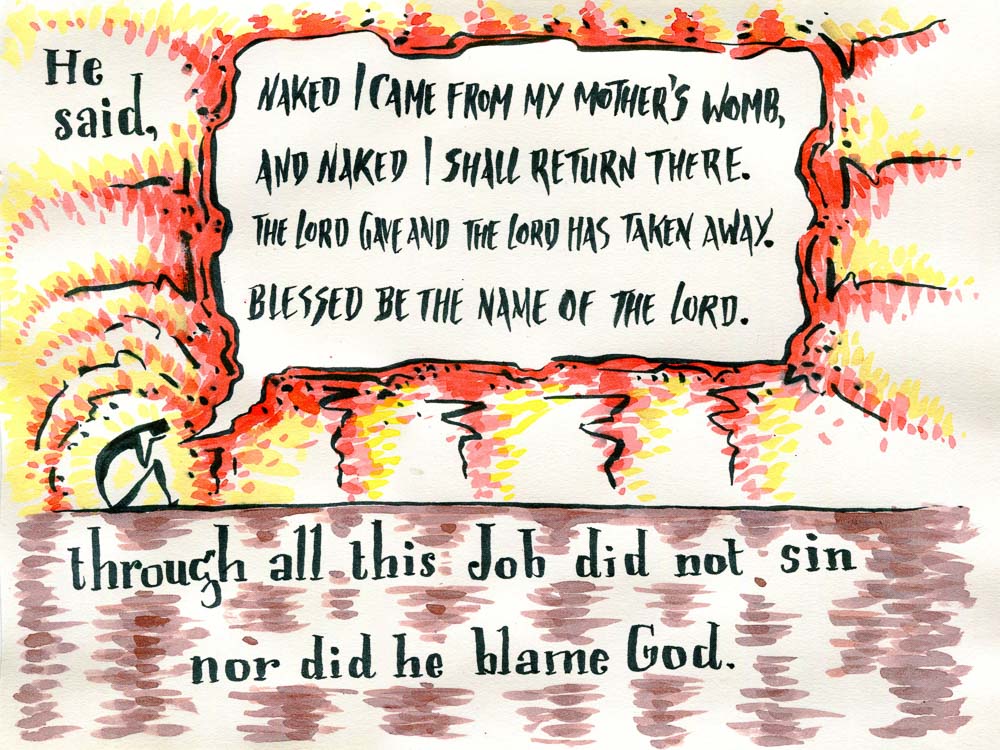 What is Job about?
What is Job about?
Nobody has it better than Job:
- He’s righteous
- He’s rich
- He has a big, happy family
But things abruptly change. In one day, his children die when a building collapses, his employees are slaughtered, and his cattle are stolen. Then, painful boils break out on his skin. Job loses everything, and is left wondering why.
The answer: Someone wants to prove that Job will curse God. This is the central conflict of the book. It’s Job’s test: will he abandon his faith or remain loyal to God?
Here’s how the story plays out:
- An adversary attacks Job. God tells a character called Satan (literally, “the accuser”) that Job is a blameless and upright man, but the satan points out that God has already blessed Job abundantly. The satan argues that Job is just returning the favor, and asserts that Job would turn on God if his blessings were taken away. God gives the satan a chance to prove it, and he immediately rips everything he can away from Job. But Job does not curse God.
- Job mourns while his friends accuse him. Job’s three friends come to comfort him, and Job begins to lament his loss to them. Their response stings: “God exacts of you less than your guilt deserves” (Job 11:6). Job’s friends tell him that this suffering must be brought on by Job’s sin, and he should repent. Job argues back that he has not incurred any punishment. Job wishes he could plead his case to God. Still, Job does not curse God. Job and his friends go back and forth three times on this issue, and then a young bystander named Elihu jumps in.
- God Himself answers Job. After Elihu weighs in, God speaks to Job. God challenges Job’s understanding by reminding Job of His wisdom, sovereignty, and power.
- Job is restored. When God finishes, Job humbly concedes that God’s will is unstoppable, and repents. God also reprimands Job’s friends for misrepresenting Him. Finally, God restores Job: he becomes twice as wealthy, he again is blessed with children, and he dies at a ripe old age.
Throughout the book of Job, we wonder whether Job will stand firm in his faith or abandon it. In the end, Job remains faithful to God, and God remains faithful to Job.
Theme verses of Job
“[Job] said, ‘Naked I came from my mother’s womb,
And naked I shall return there.
The LORD gave and the LORD has taken away.
Blessed be the name of the LORD.’
Through all this Job did not sin nor did he blame God.” (Job 1:21–22)

See the verses and verse art for all the other books of the Bible.
Job’s role in the Bible
Job is the first Old Testament book of poetry (the others are Psalms, Proverbs, Ecclesiastes, Song of Solomon, and Lamentations). Although the book of Job is best known for its story, only three of the 42 chapters are narrative. The rest are poetic discourses from Job, his friends, a young bystander, and God Himself.
Job is considered wisdom literature: the book helps us understand God, His creation, our relationship with Him, and how we should respond.
A few features make Job especially unique in the Bible:
- Job is not said to be Hebrew. All other times the Bible mentions a place called Uz, it is not in the land of Israel (Lam 4:21; Jer25:20). Job makes sacrifices on behalf of others (Job 1:5)—there is no mention of Levitical priests nor God’s covenant law with Israel.
- Job focuses on God’s role as sovereign creator. When God answers Job, He asks a series of “Where where you when . . .” questions. The book of Job attests to God’s creative power, wisdom, and authority. Because God made the universe, we can trust that He knows how to rule it.
- Job pulls back the curtain on Satan’s activities. Until the book of Job, we’ve only seen Satan influence David for Israel’s harm (1 Chr 21:1), but in Job, we see the enemy in full-on attack against God’s servant. We see that Satan can manipulate the weather (Job 1:16, 19), a person’s health (Job 2:7), and even groups of people (Job 1:15, 17). But we also see God setting Satan’s limits (Job 1:12; 2:6).
Job serves as an example of how the righteous are not immune to suffering. In the New Testament, James cites Job as an example to Christians who suffer:
As an example, brethren, of suffering and patience, take the prophets who spoke in the name of the Lord. We count those blessed who endured. You have heard of the endurance of Job and have seen the outcome of the Lord’s dealings, that the Lord is full of compassion and is merciful. (James 5:10—11)
And like Job, we are Satan’s targets now. Peter warns us that the devil “prowls around like a roaring lion, seeking someone to devour.” But our response should be the same as Job’s: we must “resist him, firm in [our] faith” (1 Pet 5:8–9).
Quick outline of Job
- Job: a righteous and rich man (Job 1:1-5)
- Satan strips Job of his blessings to get him to curse God (Job 1:6–2:13)
- Job and company discuss his situation (Job 3–37)
- Cycle 1 (Job 3–14)
- Cycle 2 (Job 15–21)
- Cycle 3 (Job 22–31)
- Elihu interrupts (Job 32–37)
- God speaks to Job (Job 38–41)
- Job’s blessings restored (Job 42)



